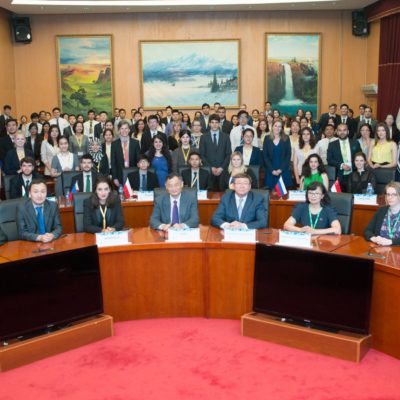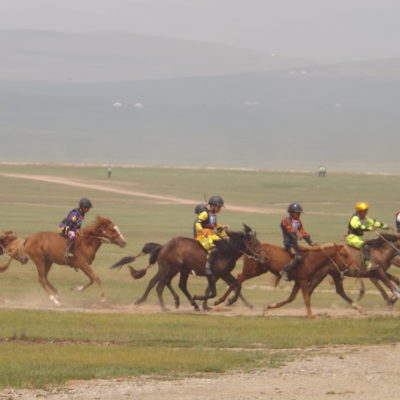By Patricia Senge
Photo by Embassy of the Federal Republic of Germany
During the sidelines of ASEM 11, a group of young student leaders visited different embassies and diplomatic offices to learn about how ambassadors such as Germany’s Gerhard Thiedemann perform their role as official representative to another country. Orange Magazine’s Patricia Senge sits down with the official.
The interview has been edited for content and brevity.
Patricia Senge: How would you describe the life of an Ambassador?
Thiedemann: Being an Ambassador is living a continuous nomadic life around the globe, and this is definitely not for everybody. I always like to say: [Being a] Diplomat is not a job but a lifestyle. Still after quite a while I enjoy it. Knowing people everywhere is a great benefit. I have been a diplomat in six different countries, one of them being North Korea.
Question: What are the preparations of the Embassy with regards to the 11th ASEM Summit that takes place in Ulaanbaatar on 15-16 July 2016?
Thiedemann: We are very much involved in the logistical preparations. This is a multilateral task and usually, we fulfill bilateral tasks. The ministries handle the substantial work of the logistical services and we work with them in terms of the technical preparations. When 53 Heads of State arrive in one city, many things need to be organized such as hotel accommodations, delegation offices, secured communications, and transportation. Together with the arriving Head of States are the plane crew, a team of journalist, and medical doctors.
Question: What is the goal of the German delegation during ASEM?
Thiedemann: ASEM is a big forum which gives thousands of formal as well as informal opportunities for the 53 Heads of States to exchange and discuss ideas. It is important to understand that ASEM is not a formal organization but a forum. For Europe, maintaining a good partnership with Asia is of utmost importance, thus there is always the intention to improve the relationship in a real way. This guides Germany’s intent to help develop a stronger relationship between the European Union and Asia.
Question: As an Ambassador, how much personal freedom do you enjoy and to what extent does the direction come from the German government?
Thiedemann: I have more liberty than one would think. There is no superior in Berlin who I have to ask for permission. In Germany, we have an open liberal democratic society and fortunately, no standard diplomacy. Instructions are given by the foreign office but within the bounds of these instructions, I am free. However, this always depends on the country [your representing as a diplomat]; one is always bound to the laws of the country. But as long as personal resources give room and one can pay for it, I am free to make choices.
Ambassadors are in constant contact with the foreign office. We also get feedback on basic issues. Once a year, all German Ambassadors meet with the Chancellor, the Federal President and the Minister of Foreign Affairs in Berlin. Of course, one cannot swim against the stream of the government nor the United Nations but within certain lines of foreign policy, I enjoy a lot of liberty.
Question: When the government leadership changes after the elections, does it affect the loyalty of the Ambassadors?
Thiedemann: In Germany, civil servants are not engaged in [political] parties. We have to be loyal to the federal foreign office and to the government no matter what party affiliation we have.
Question: What is your wish and long term perspective on diplomacy?
Thiedemann: Multilateralism has quite some value. It is a stream in European Union history and in Asia as well. However, it is not that deeply developed [in Asia] as they do not have the will to create a Union. Through more connectivity, more multilateralism engagement between the two continents would be possible. But we still have a long way to go to achieve a more fruitful multilateral cooperation between Asia and Europe.
Question: What is your advice in terms of improving negotiation skills for aspiring diplomats?
Thiedemann: This question is really hard to answer in theory as it is rather practical. At Ambassador conferences, often negotiation trainings are offered to improve negotiation skills. It is very important to have the cross-cultural aspect in mind. We are all human beings but not everyone is the same as we have different backgrounds.
Some people you can dispute directly and others you cannot. I would suggest always staying friendly, looking into the eyes of the partner, being constructive, being ready to compromise and being target oriented. Often, long speeches are held with nothing in it; a conference is not always better when it is longer. So try to limit the length [of a speech]. Of course this depends on the topic; when negotiating about war and peace, it is worth every day. Keep in mind that the opposite negotiator who came with a fixed position is another human being and that you can still have a good relationship with them even though you might take a different stand [on an issue].





